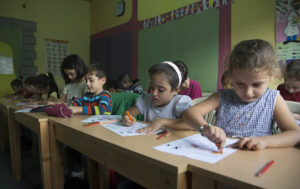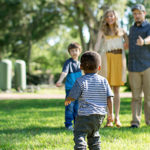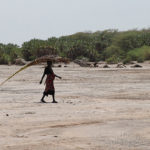A 9-year-old refugee boy traumatized by the atrocities he witnessed and the hardship his family endured found the help he needed at a church-based learning center in Lebanon.
In their homeland, the child and his family lived next to an army barracks, where days were filled with sounds of gunfire and exploding bombs and scenes of death. During a militant group raid, the boy’s father was taken to prison.
So, his mother took her children and fled to Lebanon, making a long journey on foot. After arriving in Lebanon, the family was evacuated twice. Fear and trauma rendered the boy non-vocal.
But at a Christian learning center, psychologists worked with him. Through game therapy, he started talking about his experiences and learned how to cope.
The center is a ministry of the Lebanese Society for Educational and Social Development. The Texas Baptist Hunger Offering helps provide meals and snacks for students at the learning center, along with other essential supplies. In addition, the offering also aids 79 ministries in Texas and 38 international ministries.
Alia Abboud has served the Lebanese Society for Educational and Social Development for 16 years, and has been the group’s chief development officer since spring 2016. The Lebanese Baptist society ministers to Syrian, Palestinian and Iraqi refugees who have been victims of war and conflict and been forced to flee their homes.
Dealing with emotional distress among refugee children

Refugee children often missed years of education and are far behind in their studies, in addition to being victims of trauma from their environment, she noted. The change in their families’ lifestyle and routine can trigger emotional distress among children. Long-term consequences affect their mental health, sleep and eating patterns, aggression, impulsivity, social isolation, self-harm, identity crisis and depression.
At six church-based learning centers, therapists use a multi-tiered system of support that includes individual, small-group and large-group interventions for children ages 6 to 12. By addressing learning and behavioral needs, therapists can address social and emotional challenges.
The comprehensive program supports the needs of at-risk children in all levels of difficulty. Therapists also meet with parents and provide recommendations on how to support their children at home and contribute to a peaceful and loving environment in tough situations.
Sign up for our weekly edition and get all our headlines in your inbox on Thursdays
One 11-year-old boy had exhibited extreme aggressive behavior since the start of the year. He was referred to a psychologist by his teachers after friends saw him torturing cats near his school.
Looking for signs of aggressiveness in his home, the psychologist discovered that in the child’s cultural community, violence against those who are weaker is “normal” and expected for disciplining. Through counseling sessions, the 11-year-old learned to communicate his feelings through words instead of releasing his anger on cats and other small animals.
Centers focus on children’s spiritual growth
Throughout the school year, children at the learning centers attend daily morning chapel services where they learn about God’s grace, mercy and love through Bible stories. Kids’ clubs and camps offer both spiritual and recreational activities.
Church-based educators continuously focus on the children’s spiritual growth through teaching and modeling Christ-like character. They teach Christian values such as thankfulness, respect, compassion, humility and integrity.
Those who minister to the children also learn important lessons, Abboud noted, saying the ministry changed her life.
“When I arrived in Lebanon, it was a cold, snowy and rainy December. The temperature was 10 degrees Celsius. I was wearing boots, a heavy sweater and jacket. When I saw the children, some walking barefoot—others without socks—and in very thin clothing, my heart ached for them,” she said.
The children were arriving at the learning center with wide smiles, eager to learn while disregarding all the harsh circumstances of their day-to-day lives.
“Working with these children is the most humbling experience, not only because we get to appreciate all the things God has provided us that we take for granted, but also to learn how to forgive,” Abboud said.
“Many of these families have lost sons and husbands to the invading Syrian armies. … This crisis taught us the true meaning of forgive your enemies, and to pray for those who persecute you.”
Carolyn Tomlin writes for the Christian market and teaches the Boot Camp for Christian Writers.
This is part of an ongoing series about how Christians respond to hunger and poverty, including ministries supported by the Texas Baptist Hunger Offering. Substantive coverage of significant issues facing Texas Baptists is made possible in part by a grant from the Prichard Family Foundation.














We seek to connect God’s story and God’s people around the world. To learn more about God’s story, click here.
Send comments and feedback to Eric Black, our editor. For comments to be published, please specify “letter to the editor.” Maximum length for publication is 300 words.